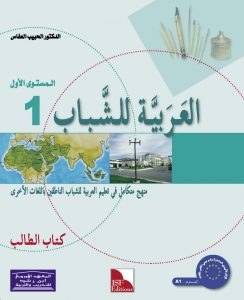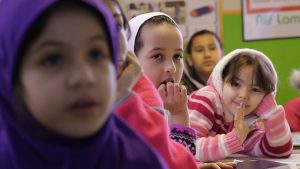Arabic for youth
ARABIC FOR YOUTH PROGRAM
 Alif Lam Center introduces Arabic for Youth in the highly successful Al-Habib Affas series. This modern curriculum will take non-speakers of Arabic on a journey of learning from the basics to a level equivalent with native speakers by consolidating and broadening their range of language skills. The classic Arabic language is presented clearly and inclusively to meet the needs of learners living in the West. The Al-Habib Affas series consists of three systematic divisions: reading, conversation, and Arab culture.
Alif Lam Center introduces Arabic for Youth in the highly successful Al-Habib Affas series. This modern curriculum will take non-speakers of Arabic on a journey of learning from the basics to a level equivalent with native speakers by consolidating and broadening their range of language skills. The classic Arabic language is presented clearly and inclusively to meet the needs of learners living in the West. The Al-Habib Affas series consists of three systematic divisions: reading, conversation, and Arab culture.
- Reading: Reading skills are developed by close examination of authentic reading passages and regular vocabulary exercises focused on word building techniques. The Al-Habib Affas series
- includes classical Arabic excerpts without the distractions of spoken dialects.
- Conversation: A careful balance of authentic and scripted listening materials builds conversational skills with native Arabic speakers.
- Arab Culture: Al-Habib Affas students are presented with Arabic and Western culture patterns to further understand the role of this timeless language.
Each section has specific objectives enabling the learner to generate language accurately in a variety of syntactical structures, ranging from typical exercises to practical conversations. This curriculum also develops fluency by communication, discovery, realization, and finally application. The Al-Habib Affas series helps Arabic learners confidently deal with different types of writing, listening, reading, and spoken text.
This series consists of four levels and contains a textbook, workbook and teacher guide.
THE VISION OF ISLAMIC EDUCATION
 The vision of Islamic education at Alif lam Center makes an important distinction between teaching “about Islam” and teaching “about being Muslim.” This is based on the view that the goal of Islamic education is not to fill our children’s minds with information “about” Islam, but rather to teach them what it means really to “be” Muslim.
The vision of Islamic education at Alif lam Center makes an important distinction between teaching “about Islam” and teaching “about being Muslim.” This is based on the view that the goal of Islamic education is not to fill our children’s minds with information “about” Islam, but rather to teach them what it means really to “be” Muslim.
Aif Lam Center believes that the effective Islamic teaching and learning must have the power to inspire and transform students. and content of the Islamic Studies curriculum must be linked to the real needs and concerns of students and to the larger issues facing the world in which they live.”
Powerful Idea
God, the World & Me
Knowing Yourself
Becoming a Moral Person
Understanding & Being Understood
Getting Along with Others
A Sense of Belonging
Drawing Strength from the Past
Islam for All Times & Places
Caring for Allah’s Creation
Facing the Challenge
Making a Difference
Taking the Lead
Content Strand
Belief & Piety
Self-concept & Well-being
Moral Development
Communications
Relationships
Family & Community
Culture
Change & Adaptability
Justice & Peace
Contemporary Issues
Action & Responsibility
Leadership Skills
Goal
God Awareness
Self Confidence
Moral Reasoning
Mutual Understanding
Cooperation
Belonging
Inspiration
Resilience
Justice
Facing Challenges
Civic Responsibility
Leadership
Islamic Education topics.
1. The Qur’an:
2. The Faith:
3. The worship:
4. The Stories of the Prophets:
5. The life of Prophet Mohammad (peace be upon him):
6. The manners and etiquettes:
During the 3 years program, some of the desired outcomes are for the students to:
1. Distinguish right from wrong.
2. Possess moral conducts (akhlaq)
3. Understand, appreciate and practice .able to practice the Pillars of Islam appropriate to their age with confidence.
4. Have a deeper understanding of Islamic Creed (aqidah) – Pillars of Iman
5. Read the Qur’an, memorize and appreciate the general meanings of these surahs.
6. Develop self-confidence as Muslims and members of the community and nation
7. Develop the respect towards others and are able to care and love them in humanity
8. Able to share with and show others about what is Islam that is accordingly to their knowledge and age appropriateness.
9. Develop an inquiring mind about Allah’s creations
TARBIYAH PROGRAM
Habits of Highly Effective Kids – Study Guide
(Concepts developed by Dr. Steven Covey and Sean Covey)
The 7 Habits Summar
- Be Proactive Fosters courage to take risks and accept new challenges to achieve goals
- Begin with the End in Mind Brings projects to completion and unites teams and organizations under a shared vision, mission, and purpose
- Put First Things First Promotes getting the most important things done first and encourages direct effectiveness
- Think WinWin Encourages conflict resolution and helps individuals seek mutual benefit, increasing group momentum
- Seek First to Understand, Then to Be Understood Helps people understand problems, resulting in targeted solutions; and promotes better communications, leading to successful problem solving
- Synergize Ensures greater “buy in” from team members and leverages the diversity of individuals to increase levels of success
- Sharpen the Saw Promotes continuous improvements and safeguards against “burnout” and subsequent no productivity
To be an effective leader, your followers must have trust in you and they need to be sold on your vision. Korn-Ferry International, an executive search company, performed a survey on what organizations want from their leaders. The respondents said they wanted people who were both ethical and who convey a strong vision of the future. In any organization, a leader’s actions set the pace. This behavior wins trust, loyalty, and ensures the organization’s continued vitality. One of the ways to build trust is to display a good sense of character composed of beliefs, values, skills, and traits.
Beliefs are what we hold dear to us and are rooted deeply within us. They could be assumptions or convictions that you hold true regarding people, concepts, or things. They could be the beliefs about life, death, religion, what is good, what is bad, what is human nature, etc.
Values are attitudes about the worth of people, concepts, or things. For example, you might value a good car, home, friendship, personal comfort, or relatives. Values are important as they influence a person’s behavior to weigh the importance of alternatives. For example, you might value friends more than privacy, while others might be the opposite.
